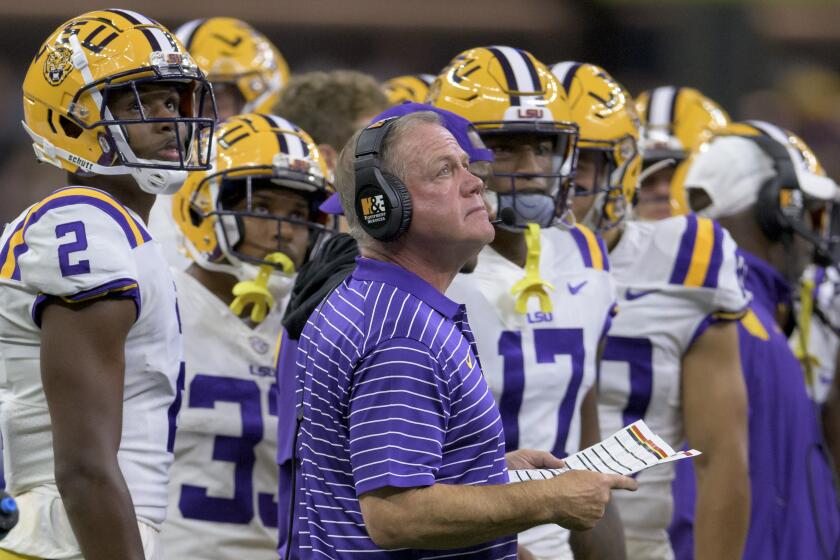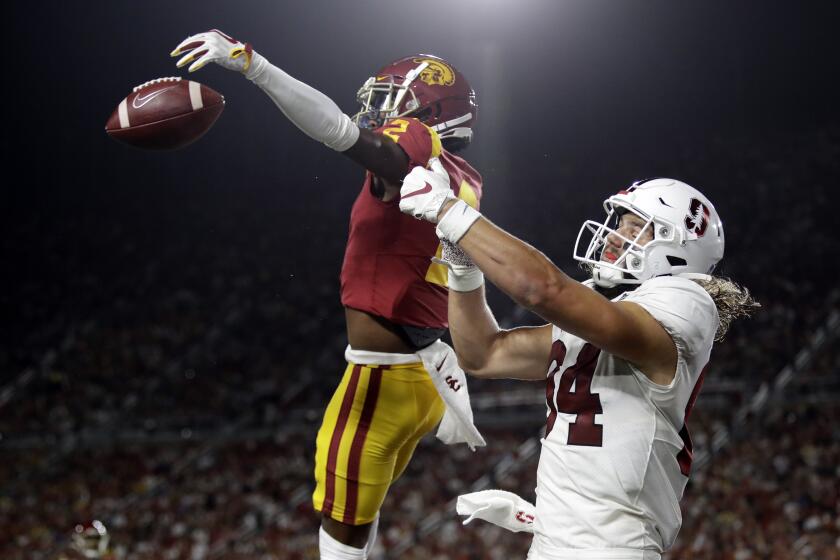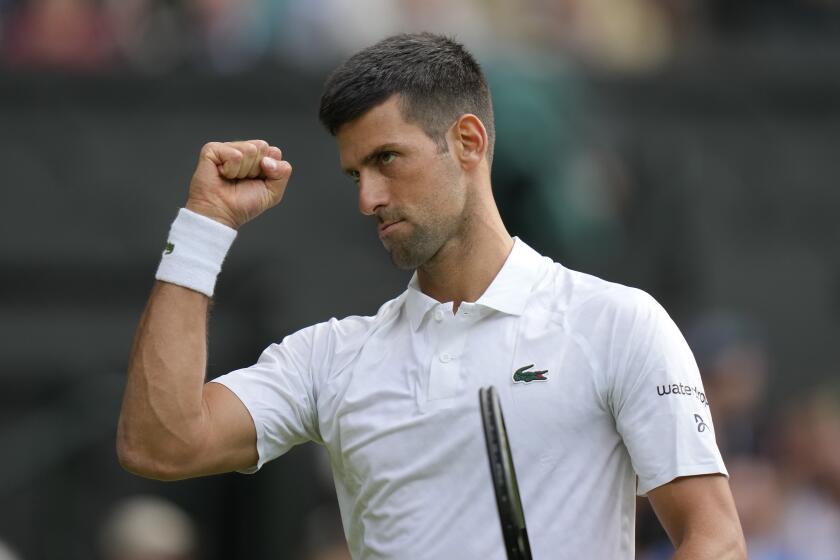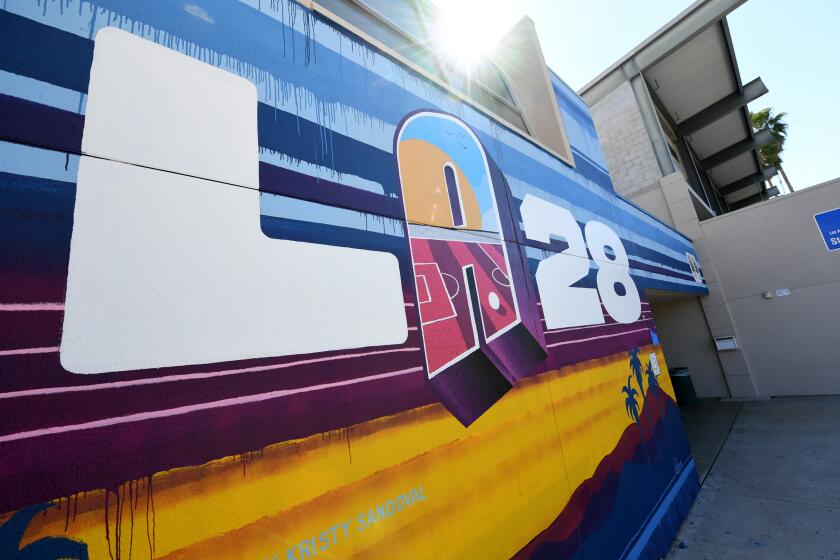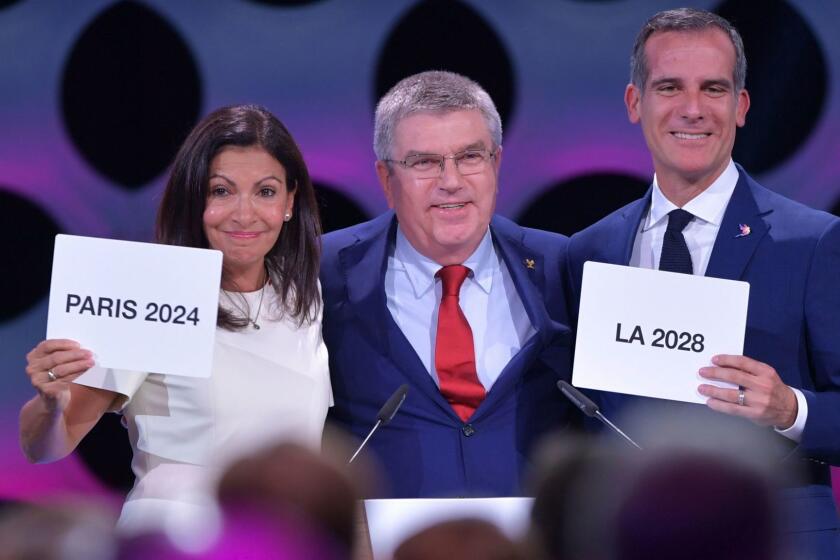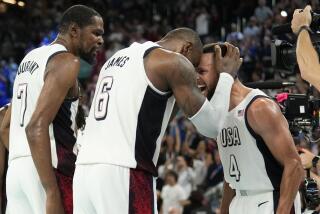Column: Enough with sending NBA stars like LeBron James to the Olympics
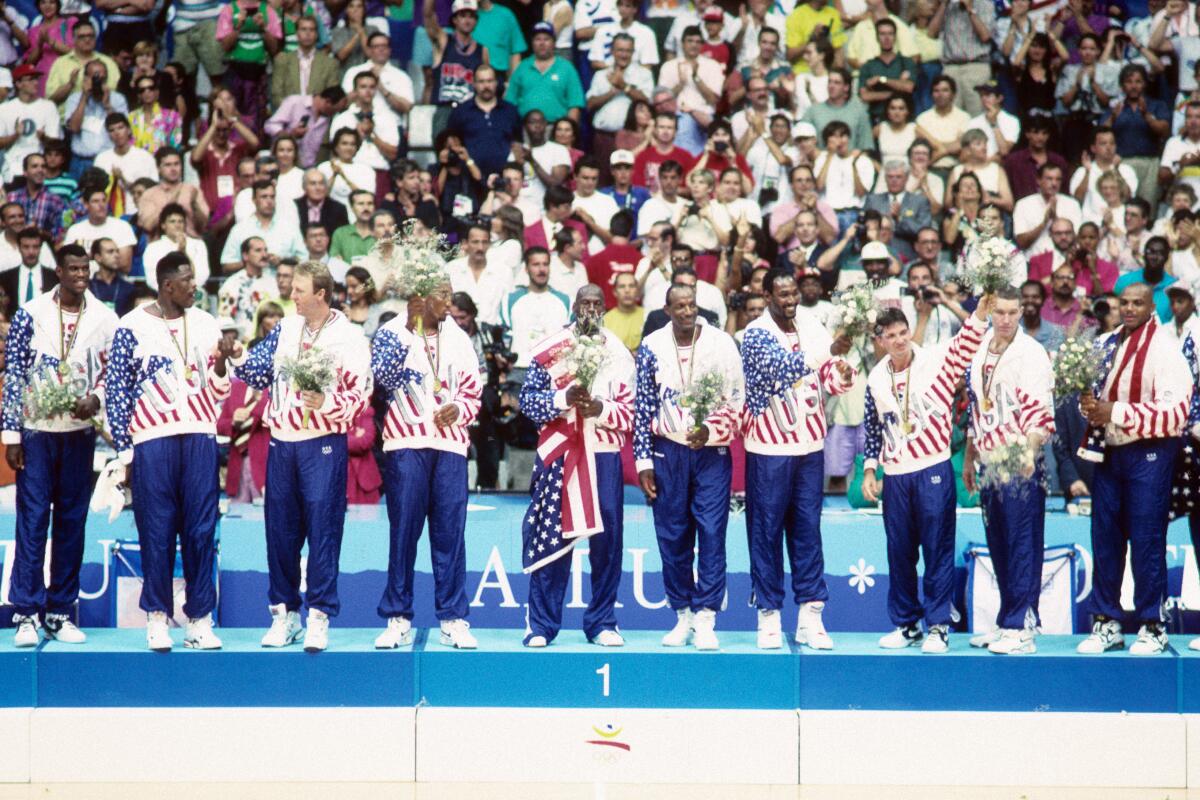
LeBron James has reportedly expressed interest in playing in the 2024 Olympics. He is also said to be recruiting other NBA superstars to join him for the Games in Paris, including Stephen Curry, who has yet to capture Olympic gold.
Opinion Columnist
LZ Granderson
LZ Granderson writes about culture, politics, sports and navigating life in America.
Given that by the time the torch is lighted, James will be 39 and Curry 36, this is likely to be the only Olympics these two icons will play together. Add in the ages of some of the other players James is said to be recruiting, and this very much feels like a goodbye to an era.
I wish it were goodbye to the “Dream Team” model in the Olympics.
The NBA has the G League to develop talent. MLB has triple-A baseball. Why doesn’t pro football pay for a minor league?
The 1992 Olympic squad with that nickname capitalized on a once-in-a-lifetime moment. Magic Johnson and Larry Bird being teammates was something no one could have imagined earlier in their careers. Times have changed: James and Curry possibly being teammates is a topic routinely discussed during the offseason. For the most part, the thrill of that Dream Team idea is gone.
Not that there was universal thrill to begin with.
After the international governing body changed the rules in 1989 to allow professionals to participate in the Olympics, the Associated Press found that nearly 40% of NBA players disapproved of the change and more than 40% did not want to play in the Olympics.
The ‘realignment’ is no fun as the PAC-12 and other conferences crumble and blur, but new matchups and dynamics will emerge.
Surprisingly, neither Michael Jordan nor Isiah Thomas — whose rivalry continues to define much of the 1992 Dream Team narrative — initially wanted to play. Thomas even warned that the inclusion of professional basketball players would usher in a win-at-all-cost mentality that would poison the Games (and ultimately he was not invited to the team). The U.S. Amateur Basketball Assn. also voted against the plan, with its president, Dave Gavitt, saying, “I’m not sure the NBA, if it had a vote, would have voted for it, either.”
In hindsight, Thomas, Gavitt and other skeptics were right.
What was once a highly sought-after honor for college students is now an option for accomplished professionals. Sometimes we send our very best, like the 2008 “Redeem Team” led by Kobe Bryant. And sometimes the elites like James Harden, Russell Westbrook and Curry opt to rest and not participate, as was the case in 2016.
Granderson: Wimbledon favorite Novak Djokovic is one of tennis’ greats. Try telling that to the fans
The Serb is on track to hold the sport’s most important records. But he is far from achieving the adoration of Roger Federer and Rafael Nadal.
It’s not as though American greatness hangs on this decision. The college players who won bronze in 1988 were outscoring opponents by an average of 30 points per game. The Dream Team came to be because our young guys lost one game by six points — hardly a “sky is falling” situation. Except that one loss came at the hands of the Soviet Union, who handed us our first loss in basketball in controversial fashion back in 1972.
We boycotted the Olympics in Moscow in 1980 because the Soviets invaded Afghanistan.
The Kremlin responded by boycotting Los Angeles in 1984.
Buckle up, Los Angeles: The Olympic juggernaut is coming. Pay attention to Paris, where the painful prologue to the 2024 Games may foretell the fate of LA28.
In 1988, we lost the head-to-head match up. In 1989, NBA players were allowed to play. In 1991, the Soviet Union broke up, and in 1992 the Dream Team beat up the world — but not the country that started this mess because it no longer existed.
Just like my desire to see an American Dream Team of NBA players represent us on the world stage.
The best college students are shut out, and the top NBA players show up when they feel like it. What’s sexy about that?
I’m not saying James and company shouldn’t play in 2024. I’m saying when they’re done, give these international games back to the kids. Not to romanticize amateurism in the Olympics, because that hasn’t existed in a very long time. Professional tennis players were playing in the Olympics before the NBA showed up. In fact Brad Gilbert, who recently helped Coco Gauff win the U.S. Open, won bronze in 1988. I just think it’s best for USA Basketball to rip the Band-Aid off and stick with those who need the Games.
To the editor: Los Angeles did not win the bidding for the 2028 Summer Olympics; it lost the bidding for 2024.
Isiah Thomas was left out of the 1992 Dream Team, and we’re still talking about it. I miss that energy.
There is an opportunity to find it again by returning it completely to athletes who need it, not want it. Why not allow collegiate players to have a shot at making the Olympic team and also to monetize their star turn? The pros are not guaranteed, so this windfall could be some players’ only shot at riches.
If we know we are no longer sending our best players out against the world, can we at least go back to sending our hungriest?
Watch L.A. Times Today at 7 p.m. on Spectrum News 1 on Channel 1 or live stream on the Spectrum News App. Palos Verdes Peninsula and Orange County viewers can watch on Cox Systems on channel 99.
More to Read
A cure for the common opinion
Get thought-provoking perspectives with our weekly newsletter.
You may occasionally receive promotional content from the Los Angeles Times.

